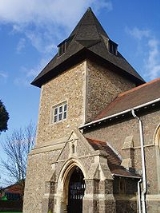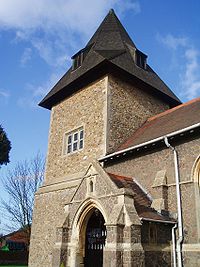
Newbold Verdon
Encyclopedia
Newbold Verdon is a village and civil parish
in the county of Leicestershire
, England
.
The Domesday Book
records the settlement as Niwebold. It acquired the suffix Verdon from Nicholas de Verdon who owned the manor in 1226. His descendant William de Ferrers was born here in 1332 or 1333. In the year of 1428 the village was quarantined due to an outbreak of cholera
, however this was short-lived as the quarantine was lifted soon after the outbreak was found to be non-serious. The parish includes Newbold Heath to the north and Brascote to the south.
Although originally an agricultural centre Newbold Verdon grew in size during the 1950s with the expansion of coal mining
in the area. This industry has since ceased and Newbold Verdon is now primarily a commuter village. The 2001 census
recorded a population of 3,193.

The Bright Hour at the Baptist Church has been running for many years along with the more recently started Grandtots Group.
.
Civil parish
In England, a civil parish is a territorial designation and, where they are found, the lowest tier of local government below districts and counties...
in the county of Leicestershire
Leicestershire
Leicestershire is a landlocked county in the English Midlands. It takes its name from the heavily populated City of Leicester, traditionally its administrative centre, although the City of Leicester unitary authority is today administered separately from the rest of Leicestershire...
, England
England
England is a country that is part of the United Kingdom. It shares land borders with Scotland to the north and Wales to the west; the Irish Sea is to the north west, the Celtic Sea to the south west, with the North Sea to the east and the English Channel to the south separating it from continental...
.
The Domesday Book
Domesday Book
Domesday Book , now held at The National Archives, Kew, Richmond upon Thames in South West London, is the record of the great survey of much of England and parts of Wales completed in 1086...
records the settlement as Niwebold. It acquired the suffix Verdon from Nicholas de Verdon who owned the manor in 1226. His descendant William de Ferrers was born here in 1332 or 1333. In the year of 1428 the village was quarantined due to an outbreak of cholera
Cholera
Cholera is an infection of the small intestine that is caused by the bacterium Vibrio cholerae. The main symptoms are profuse watery diarrhea and vomiting. Transmission occurs primarily by drinking or eating water or food that has been contaminated by the diarrhea of an infected person or the feces...
, however this was short-lived as the quarantine was lifted soon after the outbreak was found to be non-serious. The parish includes Newbold Heath to the north and Brascote to the south.
Although originally an agricultural centre Newbold Verdon grew in size during the 1950s with the expansion of coal mining
Coal mining
The goal of coal mining is to obtain coal from the ground. Coal is valued for its energy content, and since the 1880s has been widely used to generate electricity. Steel and cement industries use coal as a fuel for extraction of iron from iron ore and for cement production. In the United States,...
in the area. This industry has since ceased and Newbold Verdon is now primarily a commuter village. The 2001 census
United Kingdom Census 2001
A nationwide census, known as Census 2001, was conducted in the United Kingdom on Sunday, 29 April 2001. This was the 20th UK Census and recorded a resident population of 58,789,194....
recorded a population of 3,193.

Churches
- St. James Church (1209)
- A Methodist chapel
- A Baptist church (1833)
The Bright Hour at the Baptist Church has been running for many years along with the more recently started Grandtots Group.
Public Houses
The village has four pubs: The Old White Swan, The Jubilee, and The Windmill, actually in Brascote, and a Working Men's ClubWorking men's club
Working men's clubs are a type of private social club founded in the 19th century in industrial areas of the United Kingdom, particularly the North of England, the Midlands and many parts of the South Wales Valleys, to provide recreation and education for working class men and their families.-...
.

